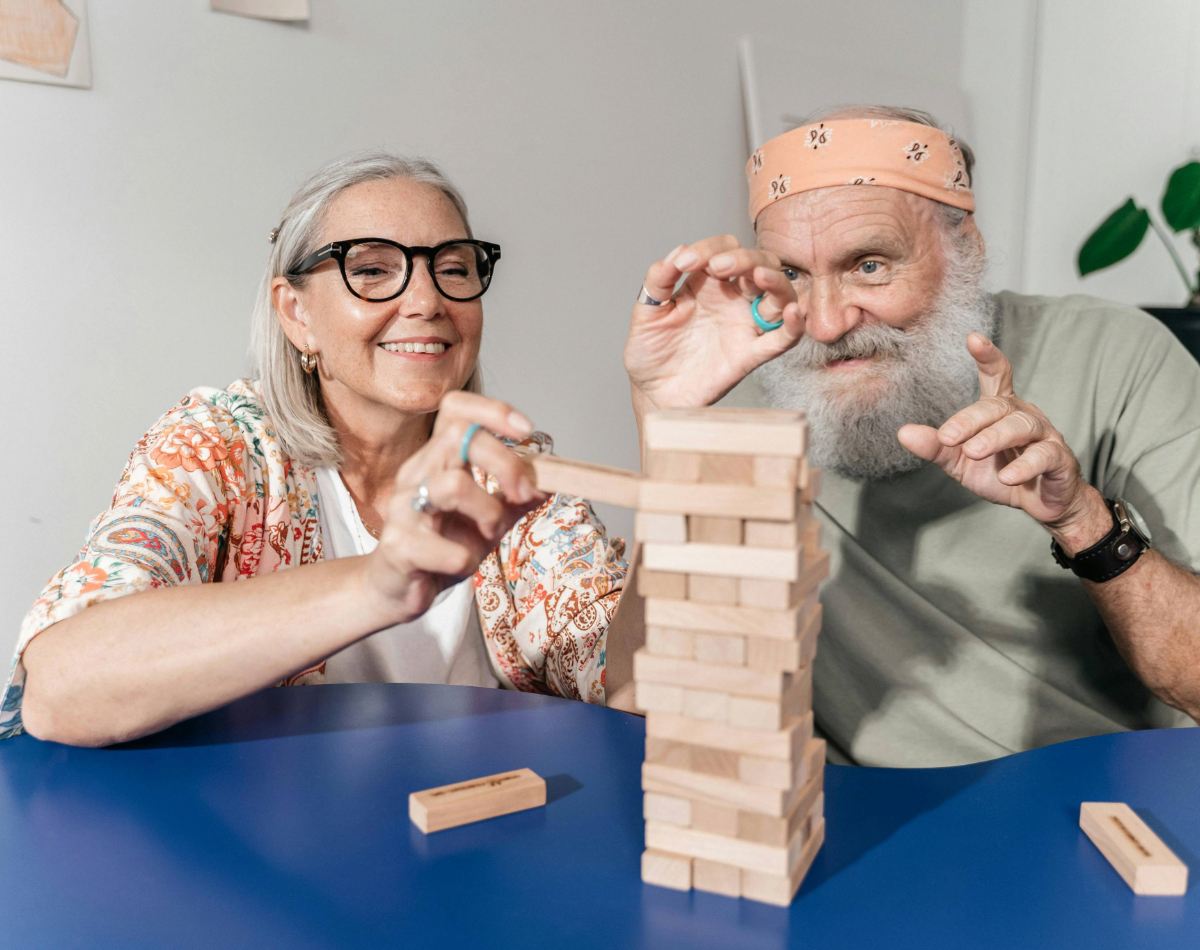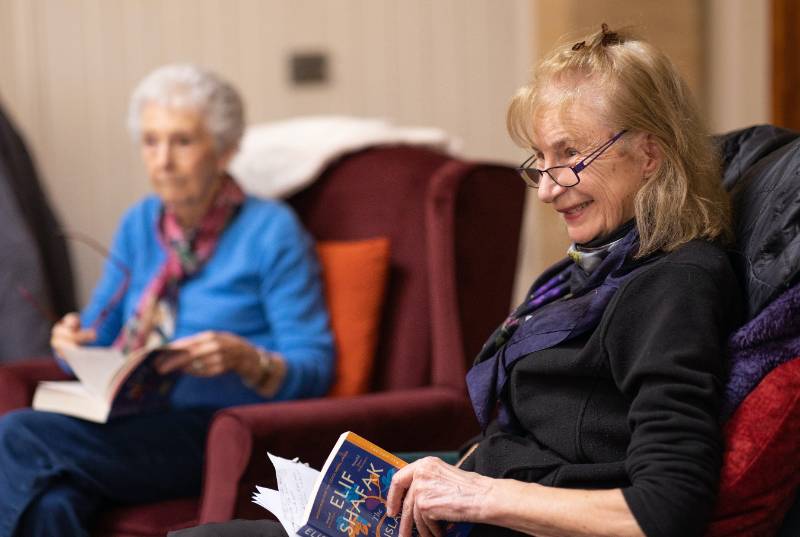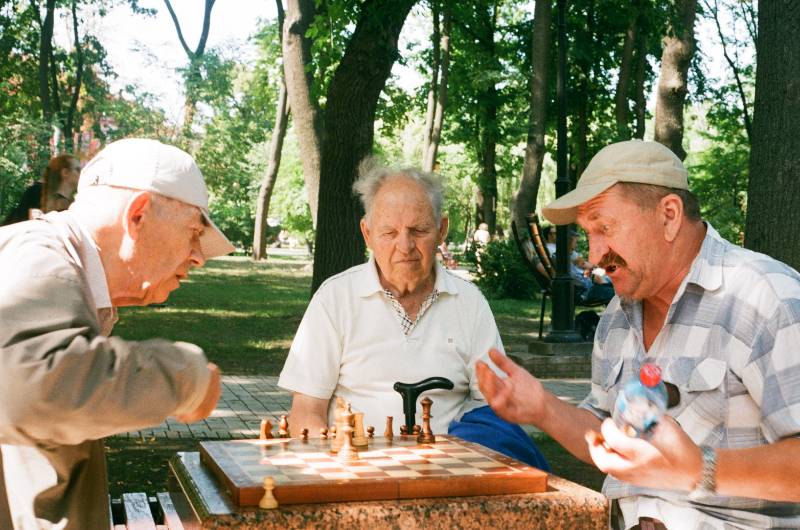Activities for dementia patients: Games, exercises, and memory activities
 Dementia is already a prevalent condition among the UK’s elderly population, and it’s predicted that rates of the brain disorder will continue to rise as life expectancies increase and the population ages. For this reason, it’s important for every care facility to have a detailed understanding of the condition and how to care for those living with dementia. Many care home teams are already well versed in the day-to-day necessities and requirements when it comes to caring for residents with dementia, from keeping them safe to catering for them. But one area which can get overlooked is providing patients with dementia activities to keep them stimulated and engaged.
Dementia is already a prevalent condition among the UK’s elderly population, and it’s predicted that rates of the brain disorder will continue to rise as life expectancies increase and the population ages. For this reason, it’s important for every care facility to have a detailed understanding of the condition and how to care for those living with dementia. Many care home teams are already well versed in the day-to-day necessities and requirements when it comes to caring for residents with dementia, from keeping them safe to catering for them. But one area which can get overlooked is providing patients with dementia activities to keep them stimulated and engaged.
If you’re looking for advice on providing fun and impactful games and activities for Alzheimer's patients, CLH Healthcare has the information you need in this detailed guide. Here we’ll share a wide range of activity ideas for dementia patients, as well as tips for encouraging your residents to get involved and keeping them safe while taking part.
- The importance of providing activities for dementia patients
- Dementia-friendly activity ideas
- How to encourage residents to get involved with dementia-friendly activities
The importance of providing activities for dementia patients

Putting on regular activities for dementia patients in your facility can help you improve the quality of life of your residents in a number of ways. Below, we’ll explore the importance of offering activities for dementia patients and how these activities can benefit their physical, emotional, and cognitive wellbeing.
Stimulating cognitive function
One of the primary benefits of engaging dementia patients in various activities is the stimulation of their cognitive function. Dementia patients often experience memory loss, confusion, and disorientation. Providing activities that challenge their minds can slow down the cognitive decline and help them retain a sense of self and identity.
Activities like puzzles, word games, and reminiscence therapy can exercise their memory, problem-solving skills, and overall cognitive abilities. These activities are not only enjoyable but also work to preserve and even improve the patients' mental acuity.
Reducing behavioural issues
Dementia can lead to increased feelings of frustration, anxiety, and depression due to the loss of familiarity and the ability to communicate effectively. This in turn can impact the patient's behaviour, meaning they can become erratic, stressed, or even aggressive.
By offering structured activities, caregivers can reduce these behavioural issues. Engaging patients in meaningful tasks keeps their minds and bodies occupied, reducing restlessness and disruptive behaviour. Because those living with dementia often struggle to express themselves verbally, activities can also be a great way to help them share how they are feeling, preventing feelings of frustration and anger.
Promoting physical health
While the focus of dementia care often centres on cognitive and emotional wellbeing, maintaining physical health is equally important. Encouraging regular physical activity can help in various ways. It can improve mobility and balance, which can reduce the risk of falls and injuries. It can also support a better sleep pattern, reducing issues related to sleep disturbances, which are common among dementia patients.
Providing a sense of normalcy
Dementia can cause patients to feel like they are losing control of their lives and that their daily routines are slipping away. Engaging in familiar activities can provide a sense of normalcy and continuity in their lives. Whether it's cooking a favourite recipe, tending to a garden, or participating in a long-loved hobby, these activities help dementia patients connect to their past and feel a sense of belonging.
Dementia-friendly activity ideas

Looking for the most impactful and enjoyable activities for dementia residents in your facility? Here we’ll take a look at a range of activities tailored to the needs and preferences of dementia patients, covering activities which benefit both physical and mental wellbeing.
Sensory experiences
Sensory activities for dementia patients can be highly beneficial. This is because these activities are specially designed to stimulate the senses, which are often strongly linked to our memories. This in turn can help residents with dementia reconnect with memories that were long forgotten. These activities can also be very calming and help soothe any agitation residents may be experiencing, making them beneficial for overall patient wellbeing too.
There are a variety of dementia-friendly sensory experiences to try out with your residents, such as:
- Sensory gardens: Sensory gardens are designed to engage all five senses — sight, touch, smell, taste, and hearing. They often include a variety of plants, textures, and elements such as wind chimes. Taking dementia patients for a stroll in a sensory garden can be a delightful and stimulating experience, providing sensory engagement.
- Sensory bins: Sensory bins are containers filled with materials like sand, rice, or beans, mixed with objects of different shapes and textures. Patients can explore the contents by running their fingers through them and identifying objects, promoting tactile and visual stimulation.
- Busy blankets: These unique blankets have buttons, zips, laces, toggles, ribbons, and all sorts attached to them, and can be customised for each individual. You can find out more about them in this busy blanket blog post.
- Folding laundry: While it may not sound like a particularly beneficial activity, folding clean, fresh-smelling laundry can actually have a number of benefits for dementia patients. As well as stimulating the resident’s sense of touch and smell, it also helps them work on their fine motor skills and gives them a sense of accomplishment and independence.
To make the experience as impactful and calming as possible, you may want to have a designated sensory room for dementia residents. This can be where you host the suggested activities above and can be a place to store a range of other dementia sensory items, such as busy blankets or a lifelike moving pet companion, like this orange tabby cat. Keep the room well-lit but avoid harsh lights and opt for warmer tone bulbs. You may also want a speaker in the room to play relaxing music or soothing nature-inspired sounds.
Games for dementia patients
Games can be an excellent way to engage the cognitive abilities of dementia patients. These activities challenge the brain and help maintain cognitive function for as long as possible, while simultaneously keeping your residents entertained. Completing or winning a round of a dementia-friendly game can also provide your residents with a sense of accomplishment and pride, giving them a confidence boost. Plus, these games can act as a group activity for dementia patients, providing residents with valuable social interaction.
Here are a few different types of games for people with dementia to try out in your care facility:
- Memory games: There are a variety of memory-based games for dementia patients to try, such as matching pairs, where players have to find matching pairs of cards by flipping them over two at a time, or quizzes on things from your residents' past, such as 50s and 60s music.
- Puzzles: Jigsaw puzzles with large, easy-to-handle pieces are perfect for dementia patients. They encourage problem-solving skills, hand-eye coordination, and a sense of accomplishment when completing a puzzle. We have a variety of puzzles to browse in our selection of activities and occupation products, such as our 12-piece in the home jigsaw puzzle.
- Bingo: Bingo is a social game that can be adapted to suit the needs of dementia patients. It helps improve cognitive function and encourages social interaction.
- Word games: Word-based activities, such as Scrabble or crosswords, can help keep the mind active, improve cognitive function, and be beneficial for communication skills.
Music therapy
Music and emotion are linked in a powerful way. People respond to music from a very early age, before words and language are developed, and this continues even towards the end of our lives, when verbal abilities may be lost. Music accesses different parts of the brain than language, so songs can be used to communicate or engage with someone who has been diagnosed with dementia, even if they no longer speak or respond to other people’s words.
One way to incorporate music into your dementia patient’s activity time is simply by listening to it. Playing music that meant something to them, such as a favourite song, a piece of music from their wedding, or a tune they used to sing to their children, can tap into powerful memories and emotions. This may also encourage residents to hum, sing along, or tap their feet or hands to the beat, allowing them to practice their fine motor skills. You can help your residents reminisce by crafting a playlist of their favourite songs. Ask them about their favourite artists or turn to family members if you are unsure. You can craft individual playlists for each patient, or make a group playlist and gather residents together in one room to enjoy their favourite songs with a cup of tea and cake. This can be great for social interaction as it allows residents to share stories from their past.
Music can be an effective way to impact a resident’s mood outside of your regular scheduled activity time too. For instance, if a person diagnosed with dementia resists your efforts to help them get dressed, playing soothing music or a favourite song can help lessen any distress.
Bear in mind that music can awaken negative emotions as well as positive ones, so watch the person closely for any signs of discomfort and turn the music off if you think it is causing undue distress. Expressing sadness may be a normal reaction to a strong memory or association with the music and just sitting with the person during this time may be the best response.
If you’re looking for a more active form of musical therapy for residents with dementia, there are plenty more creative activities for them to try, such as getting them involved in a group singalong. Singing is not only a fun activity for your residents but can also promote social interaction and help residents work on their communication skills. You may also want a box of small musical instruments for residents to experiment with, such as triangles, xylophones, and tambourines.
Art therapy
Another great activity for keeping people with dementia or Alzheimer’s entertained and engaged is art therapy. For people with dementia, communication can be difficult at times, and when they are unable to express how they are feeling, it can lead to a range of problems, including aggressive and violent outbursts. However, creative art classes allow them to express how they are feeling and get all of their emotions out in a creative way.
As well as being an emotional outlet, arts and crafts require concentration, memory, and problem-solving skills. These activities encourage patients to use their brains actively, which can help them practice cognitive skills, as well as fine motor skills from the physical movement. Engaging in artistic pursuits also allows individuals to maintain a sense of identity and creativity. It reminds them of their abilities and interests beyond their condition, and may even help residents find a brand new hobby.
Here are a few of the most popular types of arty activities for dementia residents to try out at your facility:
- Painting and drawing: Provide patients with art supplies and encourage them to paint or draw. Even those with no prior artistic experience can benefit from the process.
- Craft activities: Craft activities like making greeting cards or decorative items can be both enjoyable and satisfying for dementia patients, as well as provide them with a sense of purpose.
- Colouring books: Adult colouring books offer a structured and calming creative outlet for dementia patients. It's a simple and accessible way to engage with art.
- Knitting: While a little more complex than the other activities on this list, knitting requires focus and attention to detail, plus it encourages residents to practice their fine motor skills, making it a beneficial hobby for those in the early stages of dementia. However, you should keep an especially close eye on residents if you choose to do this activity to ensure they don’t get injured by the needles.
Gardening

Gardening is a therapeutic and meaningful activity that connects dementia patients with nature and has many mental and physical benefits. For starters, gardening is a physical activity that can help to improve strength, flexibility, and balance, which are important for those with dementia who may be experiencing sensory impairment and a loss of muscle tone as they age. Gardening activities heavily involve using the hands too, so getting people with dementia out in the garden can particularly improve hand strength and help them refine their fine motor skills.
Gardening can also restore their confidence by giving them responsibility and letting them take charge. Whether that means delegating the daily watering of plants to them or allowing them to choose and grow their own fruit and vegetables, they are sure to feel a sense of encouragement, accomplishment, and purpose from these horticultural activities.
There are a few different ways residents with dementia can enjoy spending time in the garden, such as:
- Planting sensory plants: Sensory plants like lavender, rosemary, or mint are a great addition to a care home garden. Planting them is great for encouraging patients to get outside and get active. Plus, once the plants have blossomed, residents can touch, smell, and even taste these plants, providing a multi-sensory experience. Opt to plant these in raised garden beds to make the gardening activity as accessible as possible.
- Create indoor potted plants: Your residents can enjoy gardening in the colder weather too by going indoors to make some potted plants for your facility.
- Bird watching: Residents can enjoy the garden when they aren’t gardening too, such as by setting up bird feeders and birdhouses to attract local wildlife. Patients can enjoy watching and identifying birds and listening to birdsong to make it a full audio-visual experience.
It's important to note that the best activities for those with dementia will be dependent on their physical abilities and the severity of their condition, but it's typically best to stick with very low-intensity gardening activities like potting and planting rather than raking.
Pet therapy
For someone with dementia who always loved animals, pet therapy can be a fantastic way to provide adequate stimulation for them. Various studies have shown that pets are able to help relieve negative feelings[1]. Studies have also shown that pet therapy can help lower blood pressure and heart rate, as well as reduce cortisol —the stress hormone — while increasing serotonin —the feel-good hormone[2].
There are various options for pet therapy, with one popular option being hiring a therapy dog to visit your care home regularly. If you can opt for the same dog every time, this can ensure that your residents feel more comfortable around the dog, and vice versa. There is also the option of arranging a day trip to a petting zoo, where there are lots of animals that can provide therapy.
If you are looking for an alternative to pet therapy which doesn’t involve live animals, you may want to browse our range of companion pets. We have a selection on offer, each of which comes with pet-like movements, sounds, and even a brush and care guide. We have an orange tabby and silver companion cat on offer, both of which come with realistic VibraPurrs, as well as a golden puppy which comes with built-in sensors to respond to motion and touch.
Cooking
Running cooking sessions can be a great activity for dementia residents, particularly if they have always enjoyed cooking in the past. Cooking is a practical activity that, as long as the proper safety precautions are taken, can be a fun, safe, and enjoyable way to keep people with dementia active and busy. It can also be a great way to connect them with their past if you create some of their favourite childhood recipes, such as stew and dumplings and spam fritters. Appetite loss is a common dementia side effect, so getting them involved in preparing some of their favourite old dishes may even increase their interest in mealtimes.
If a person is in the early stages of dementia, then they may not need any help, just your presence there to ensure each part of the process is performed safely. If they are in the later stages of dementia or Alzheimer’s, then they may simply watch and stir occasionally. Baking sweet treats can also provide a hands-on experience for residents, and decorating the baked goods can be a particularly beneficial activity for residents with later-stage dementia as there aren’t any hot or sharp objects involved.
Exercise
Exercise comes with various benefits for people with dementia, from helping to regulate their sleep and preventing restlessness to helping them maintain a more positive mood and reducing the chances of depression developing. By improving physical fitness and strength, exercise can also help dementia patients maintain their ability to perform everyday tasks, enhancing their independence and quality of life.
When it comes to how you can keep them active, this will depend on their level of mobility. If they have low mobility, you may need to get more creative with the physical activity that is planned. Some good options tend to include:
- Taking regular walks
- Biking (if the person is physically able to)
- Fishing
- Dancing
- Water aerobics
- Balance-related exercises, such as yoga, Pilates, and tai chi
There are also various group physical activities for dementia patients which are great for encouraging cooperation and connection among residents. These can include doubles tennis, walking football, and bowls. Other exercises can also be modified to become team games, such as golf and bowling.
Meaningful activities for dementia patients
Engaging dementia patients in reminiscence-based activities that hold personal significance can foster a sense of purpose and identity. This can be especially impactful on the wellbeing of your residents with dementia, as many with the condition tend to lose a sense of identity which in turn can negatively impact their mental health. On top of this, studies have shown that reminiscence therapy may also be beneficial for cognition and communication skills[3].
If you’re looking for more meaningful things to do with dementia patients, here are a few activity ideas to try out:
- Life story work: Encourage patients to create a life storybook or video. This project allows them to reminisce about their life, creating a valuable keepsake for their loved ones.
- Memory boxes: Memory boxes filled with personal mementoes and photographs can serve as a tactile connection to one's life and experiences.
- Photo album flick-throughs: If possible, ask close friends or relatives to bring in photo albums with pictures of your resident from various periods. Carers can look through these with individual residents, or you can even encourage residents to come together to share their photographs and their stories to help your patients connect with one another.
- Coffee and cake with loved ones: Hosting regular catch-up opportunities allows those closest to your residents to help your dementia patients reminisce and remind them of memories which may have slipped away.
How to encourage residents to get involved with dementia-friendly activities

Dementia-friendly activities come with numerous benefits for residents and many will no doubt appreciate the opportunity to give them a go. However, some may need a little more encouragement. This could be because of a lack of motivation, lack of interest, or even lack of confidence. Put the following advice into action to ensure that all of your residents feel comfortable giving your activities a go.
Create a dementia-friendly environment
Modifying the physical environment to make it dementia-friendly is a crucial step in encouraging residents to engage in dementia-friendly games and activities. Ensure that activity spaces are well-lit, uncluttered, and easy to navigate to make taking part comfortable and as easy as possible. You should also be wary of preventing sensory overload, such as keeping the music at a lower volume while hosting music-based activities. These modifications can reduce confusion and make residents feel more comfortable, thereby promoting their involvement in activities.
Ensure residents have everything they need
Part of the reason residents may avoid taking part in activities is worrying that they won’t have everything they need in order to feel comfortable. Ensure that every resident taking part in your dementia-friendly activities can do so by making the activities completely accessible. This could include:
- Providing clothes protectors and assistive dining aids for any food or cooking-related activities
- Ensuring residents have access to incontinence products
- Keeping as many activities wheelchair-friendly as possible
- Providing pressure cushions if the activity involves sitting in one place for a long period
- Having wet and dry patient wipes on hand to quickly and discretely clean up any mess or spills
- Having specialist seating or rise and recline chairs in your activity room for residents who struggle to get in and out of regular lounge chairs
Take a personalised approach
Each person with dementia is unique, with individual preferences, interests, and abilities. To engage residents effectively, it is crucial to take a personalised approach. Get to know the residents, their life histories, hobbies, and past experiences. Offering activities tailored to their preferences can significantly increase their participation and enjoyment.
Offer a variety of activities
To cater to the diverse interests and abilities of residents, it is important to provide a wide range of dementia-friendly activities. By offering a variety of options, you increase the chances of residents finding activities that resonate with them. A good way to offer variety is to split your activities into three categories and try to offer one from each every week:
- Physical activities, such as exercise or gardening
- Mental activities, such as word games or reminiscence therapy
- Creative activities, such as music or art therapy
Promote social interaction
Social interaction is a vital component of dementia-friendly activities. Not only can it help your residents bond with each other, but it can be beneficial for their communication skills. Encourage residents to participate in group activities for dementia, such as group games, sing-alongs, cooking sessions, or something as simple as conversation circles. Building social connections can combat isolation and foster a sense of belonging, helping to make your care facility feel more like home.
Practice flexibility and patience
Residents with dementia may have good days and bad days. It is essential to approach them with flexibility and patience, remembering that this is completely normal. Some days, they may be eager to participate, while on others, they may be more withdrawn. Adjust the activities to suit their current mood and abilities if possible. You should also avoid putting pressure on them to take part, as this may make them feel more isolated and negatively impact their confidence. Give them time and space until you think it is appropriate to intervene.
Evaluate and adapt
If you find that residents regularly avoid getting involved or are not taking to the activity as well as you hoped, take some time to evaluate the situation. Regularly assessing the effectiveness of your dementia-friendly activities and being willing to adapt and improve them based on feedback and observations shows your residents you value their experience and input. It also means that your residents with dementia can get the most out of these activities.
As well as assessing the success of your activities yourself, make sure to get the patients involved and ask them for their feedback. This can give you a better understanding of why an activity may be less appealing, as well as give you ideas for future activities and games.
Dementia-friendly activities can greatly enhance the quality of life for individuals with dementia. Encouraging residents to get involved in these activities requires a holistic approach that takes into account their unique needs and preferences. By understanding the importance of these experiences and hosting a wide variety of different activities for your dementia residents, you can make your facility feel more like home.
We have a wide range of care home essentials for keeping residents comfortable while enjoying dementia-friendly activities, from patient care and protection products to care equipment and wellbeing essentials. See for yourself and browse our full range today.
Looking for even more care home management tips and advice? Head to our learning centre today for more informative guides, including our care home cleaning schedule and guide to opening and running a care home.
[1] https://www.ncbi.nlm.nih.gov/pmc/articles/PMC6826684/




